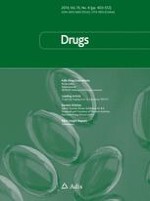Anzeige
01.12.2007 | Leading Article
Induction Therapy in Renal Transplantation
An Overview of Current Developments
Erschienen in: Drugs | Ausgabe 18/2007
Einloggen, um Zugang zu erhaltenAbstract
An overview of the past 10 years of clinical renal transplantation would include progress in the development of new induction protocols (non-depleting versus depleting monoclonal and polyclonal antibodies, plasmapheresis and intravenous immunoglobulins) designed to reduce the incidence and severity of rejection and adverse effects as well as improve long-term graft and patient survival. These modalities have been introduced primarily to reduce the incidence of acute rejection episodes leading to early graft loss, decrease the need for higher toxic doses of maintenance immunosuppressive drugs, such as calcineurin inhibitors, and possibly aid in the pursuit of the goal of achieving immunological tolerance and the avoidance of all long-term immunosuppressive therapy. What has resulted during the past 20 years as the use of induction agents has become more popular is the concurrent improvement in detection and treatment of acute and chronic infectious (primarily viral), and opportunistic and quasi-malignant disease accompanying the use of these agents and, therefore, their increase in popularity. However, the overall cost of therapy and the long-term results of protocols in which these agents have been used have not resulted in a definitive benefit thus far, because of the lack of sufficient numbers of defined randomised, long-term studies and the continuing introduction of newer protocols based on even more recent advances. The specific agents used for induction therapy to date, and the rationale for their introduction and mechanisms of action are discussed in this review.











